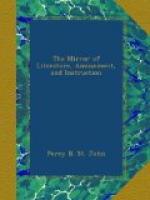lest I should lose one line or look in the intelligent
report which I should hear the next morning! The
punctuating of time at that early period—every
thing that gives it an articulate voice—seems
of the utmost consequence; for we do not know what
scenes in the
ideal world may run out of them:
a world of interest may hang upon every instant, and
we can hardly sustain the weight of future years which
are contained in embryo in the most minute and inconsiderable
passing events. How often have I put off writing
a letter till it was too late! How often had
to run after the postman with it—now missing,
now recovering, the sound of his bell—breathless,
angry with myself—then hearing the welcome
sound come full round a corner—and seeing
the scarlet costume which set all my fears and self-reproaches
at rest! I do not recollect having ever repented
giving a letter to the postman, or wishing to retrieve
it after he had once deposited it in his bag.
What I have once set my hand to, I take the consequences
of, and have been always pretty much of the same humour
in this respect. I am not like the person who,
having sent off a letter to his mistress, who resided
a hundred and twenty miles in the country, and disapproving,
on second thoughts, of some expressions contained in
it, took a post-chaise and four to follow and intercept
it the next morning. At other times, I have sat
and watched the decaying embers in a little
back
painting-room (just as the wintry day declined,) and
brooded over the half-finished copy of a Rembrandt,
or a landscape by Vangoyen, placing it where it might
catch a dim gleam of light from the fire; while the
Letter-Bell was the only sound that drew my thoughts
to the world without, and reminded me that I had a
task to perform in it. As to that landscape,
methinks I see it now—
“The slow canal, the yellow-blossom’d
vale,
The willow-tufted bank, the gliding sail.”
There was a windmill, too, with a poor low clay-built
cottage beside it:—how delighted I was
when I had made the tremulous, undulating reflection
in the water, and saw the dull canvass become a lucid
mirror of the commonest features of nature! Certainly,
painting gives one a strong interest in nature and
humanity (it is not the dandy-school of morals
or sentiment)—
“While with an eye made quiet by
the power
Of harmony and the deep power of joy,
We see into the life of things.”
Perhaps there is no part of a painter’s life
(if we must tell “the secrets of the prison-house”)
in which he has more enjoyment of himself and his
art, than that in which after his work is over, and
with furtive sidelong glances at what he has done,
he is employed in washing his brushes and cleaning
his pallet for the day. Afterwards, when he gets
a servant in livery to do this for him, he may have
other and more ostensible sources of satisfaction—greater
splendour, wealth, or fame; but he will not be so




